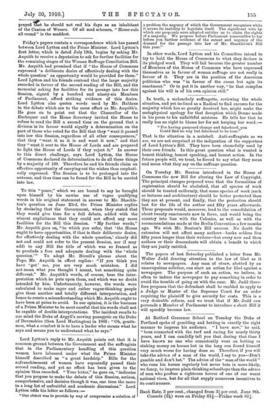To this "poser," which we are bound to say he
brought upon himself by his unwise use of vague qualifying words in his original statement in answer to Mr. Shackle- ton's question on June 23rd, the Prime Minister replies by declaring that the Government, when they stated that they would give time for a full debate, added with the utmost explicitness that they could not afford any more facilities for the Bill this Session. "My further words," Mr. Asquith goes on, " to which you refer, that the House ought to have opportunities, if that is their deliberate desire, for effectively dealing with the whole question,' clearly did not and could not refer to the present Session, nor (I may add) to any Bill the title of which was so framed as to preclude a free and adequate dealing with the ' whole question." To adopt Mr. Birrell's phrase about the Pope, Mr. Asquith in effect replies : "If you think you have got' me, you are very much mistaken. I did not mean what you thought I meant, but something quite different." Mr. Asquith's words, of course, bear the inter- pretation which he puts upon them, and which was no doubt intended by him. Unfortunately, however, the words were calculated to make eager and rather vague-thinking people give them another and totally different interpretation, and hence to create a misunderstanding which Mr. Asquith ought to have been at pains to avoid. In our opinion, it is the business of a Prime Minister to be most careful that his words shall not be capable of double interpretations. The incident recalls to our mind the Duke of Argyll's moving panegyric on the Duke of Devonshire (then Lord Hartington) in 1886: "Oh, gentle- men, what a comfort it is to have a leader who means what he says and means you to understand what he says."






































 Previous page
Previous page